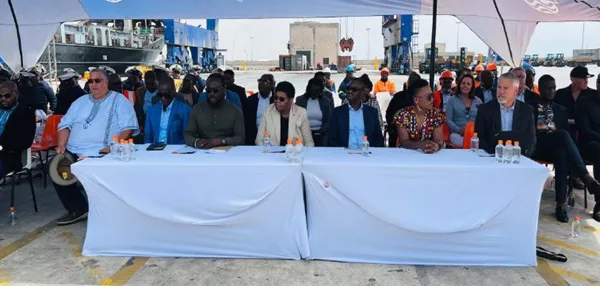At the International Table Grape Symposium commercial director of Capespan, Charl du Bois, told attendees that the port of Cape Town really challenging at the moment.
Namibian grape growers have realised an alternative which, although not closer than Cape Town, lies within their own borders.
"This week saw the first large scale export of table grapes from Namibia via the new container terminal situated in the port of Walvis Bay on the container ship MSC Sweden, with the NGC having the biggest number of containers on board of all Namibian growers," a press statement issued by Capespan and Namibia Grape Company reads.
"Capespan will export more than 275 containers from Walvis Bay this year with MSC, being about 1/3 of the NGC crop. In total MSC plans to export 1,000 containers, which in turn is around a third of the Namibian crop."
The statement continues that this is cargo that would normally have been trucked to the port of Cape Town.
"Shipping through Walvis Bay has the benefit that it saves around 4 days of shipping versus Cape Town, and therefore ensures fresher fruit for customers. The port is also very efficient and does not suffer from wind delays or poor productivity like Cape Town, making Walvis Bay a compelling export hub. Capespan’s international customers are extremely excited about the prospects for this new supply route, as it is estimated fruit will arrive at least one week sooner in the market compared to shipments from Cape Town."
"This is one example of how the Namibian Grape Company (NGC) and Capespan Namibia are leaders in table grape production in Namibia. The NGC and Capespan started discussions with the Mediterranean Shipping Company (MSC) in July of this year to trial the shipping of table grape containers via Walvis Bay."
With 475 hectares under production the Namibian Grape Company (NGC) is the biggest table grape producer in Namibia. Capespan manages the table grape farms owned by the National Youth Service of Namibia since 2009 through the Namibian Grape Company (NGC).
 Angelo Peterson (chair of Capespan Namibia), Richwell Lukonga (chair of Namibia Grape Company), Hon. Florian Donatus (Walvis Bay Constituency Councillor), Hon. Agnes Tjongarero (Minister of Sport, Youth and National Service), Andrew Kanime (NAMPORT CEO), Saara Mutondokwa (deputy mayor of Walvis Bay) and Charl du Bois, Capespan commercial executive
Angelo Peterson (chair of Capespan Namibia), Richwell Lukonga (chair of Namibia Grape Company), Hon. Florian Donatus (Walvis Bay Constituency Councillor), Hon. Agnes Tjongarero (Minister of Sport, Youth and National Service), Andrew Kanime (NAMPORT CEO), Saara Mutondokwa (deputy mayor of Walvis Bay) and Charl du Bois, Capespan commercial executive
In a press statement Capespan and Namibia Grape Company said: "The celebration was honoured by the presence of various dignitaries, including the Hon. Agnes Tjongarero, Minister of Sport, Youth and National Service; Her Worship, Councilor Saara Mutondokwa, Deputy Major of Walvis Bay; Mr. Andrew Kanime, NAMPORT CEO; Mr. Richwell Lukonga, Chairperson of Namibia Grape Company (NGC); Mr. Angelo Petersen, Chairperson of Capespan Namibia; Mr. Jacob Hamutenya, NYS Deputy Board Chairperson; Dr. Felix Musukubili, National Youth Service Commissioner; Mr. Ian Fairlie – Reefer, Director, the Mediterranean Shipping Company and Mr. Charl du Bois, Commercial Executive of Capespan."
Her Hon. Minister Tjongarero highlighted the fact that the Namibian government’s mission was to create an environment where entrepreneurial private companies, like Capespan, could thrive, during her keynote address. She recognized the critical role of export- oriented agriculture in creating jobs and foreign income for Namibia.
South African fruit might follow the same route
Andrew Kanime, CEO of Namibian port operator Namport, in his address committed that Namport would ensure it delivered a world class service, to ensure table grape cargo volumes would in future prefer Walvis Bay to beleaguered South African ports in future.
A lack of sufficient specialised reefer generator sets in Namibia was solved through South African trucks belonging to Macdonalds Transport, in addition to Namibian operators.
"There are challenges, like the 508 km longer round trip from Aussenkehr for trucks versus Cape Town," Du Bois points out in the press statement. "The competitive logistical solution provided by Walvis Bay will surely attract more cargo from Capespan and others in future. [...] It could well be that not only the 3,500 containers of Namibian grapes will soon be exported via Walvis Bay, but that fruit grown in South Africa will also seek out this fast and efficient logistical route in future."










